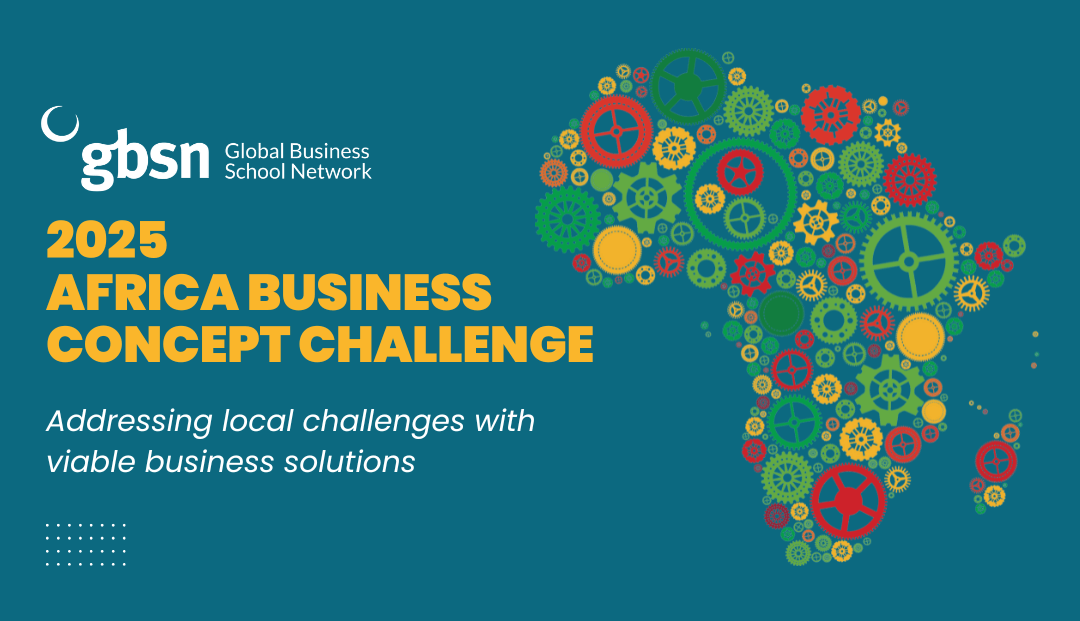
The Africa Business Concept Challenge puts student teams to the test, requiring them to develop a viable business concept that addresses a locally relevant challenge or problem related to Agenda 2063. This year’s virtual business concept competition for African undergraduate and graduate students was sponsored by Stanford Seed and UConn School of Business.
The following teams were selected to advance to the final stage of the competition, where they presented their business concepts live to our panel of international judges for the $5,000 USD scholarship prize!
And the winner is… Team EMONJOY!
1st Place

University of Cape Coast, Ghana
Team: EMONJOY
Team Members: Enoch Mbawin Alale*, Agnes Joy Aryee, Simon Etornam Feliste
Faculty Mentor: Samuel Kofi Tulashie
EMONJOY: Organic Pesticide Solution for African Farmers
EMONJOY offers a 100% plant-based, biodegradable pesticide formulated from neem and local plant extracts to address West African farmers’ challenges with crop pests. The solution helps farmers reduce the 60% annual crop loss while avoiding the health and environmental hazards of synthetic pesticides. By providing an affordable, effective alternative that meets international export standards, EMONJOY enables smallholder farmers to increase yields, access premium markets, and improve soil health. The company plans a phased rollout starting with pilot testing in Ghana before expanding across West Africa, directly supporting the UN Sustainable Development Goals related to health, clean water, responsible production, and environmental protection.
* Team captain
2nd Place

University of Buea, Cameroon
Team: NeuroCare/Stemgirlz
Team Members: Ebua Cindy Sangha*, Ngong Odilo Bertila, Amber Yabuah Fuambu, Tifuh Percilia Nji
Faculty Mentor: Dr. Kolle George Nkume
NeuroCare: Digital Support for Neurodivergent Communities in Cameroon
NeuroCare is a mobile app addressing the significant barriers faced by neurodivergent individuals in Cameroon, where specialized services are scarce and prohibitively expensive. The app provides early screening tools, AI-powered learning resources, peer support forums, and direct access to therapists in multiple languages (English, French, and Pidgin). By offering a digital-first, culturally adapted solution, NeuroCare makes essential services accessible to the estimated 5 million neurodivergent Cameroonians and their families. The platform employs a hybrid tech-human approach, combining AI with real specialist support, and offers a freemium model ensuring core features remain free while generating revenue through specialist referrals, sponsored content, and premium features.
3rd Place

The American University in Cairo, Egypt
Team: sanay3eya صنايعية
Team Members: Nayera Ahmed Fathy Badawy*, Marwan Sayed Fekry Abdelwahab, Nancy Mohamed Shaker El Assaar
Faculty Mentor: Dina El Bassiouny
sanay3eya: Formalizing Egypt’s Craftsmen Sector
sanay3eya (“The Craftsmen”) addresses the challenge that two-thirds of Egypt’s working population operates in the informal sector, including an estimated 2 million craftsmen. The business creates a syndicate-like platform that brings these skilled workers into the formal economy while providing them with medical insurance, pensions, and professional licensing. Through a user-friendly mobile application, customers can easily find and hire verified craftsmen, while craftsmen gain access to training, insurance benefits, and larger government projects. The platform initially targets high-demand areas like Nasr City, Heliopolis, and New Cairo, with plans to expand nationwide. By formalizing this sector, sanay3eya supports multiple UN Sustainable Development Goals, including poverty reduction, decent work, and economic growth, while generating revenue through membership fees, training certifications, corporate partnerships, and supplier relationships.
Thank you to our investor experts and judges, who provided feedback, guidance, and invaluable advice to our student teams!
Investor Experts

Marilena Antoniadou
Associate Dean – Education and Employability
American College of Greece

Sourabh Bhattacharya
Associate Professor
Haldia Institute of Technology

Olof Brunninge
Associate Professor
Jönköping International Business School

Malick Diallo
Senior Business Transformation Advisor
Stanford Seed

Daniel Gameti
Adjunct Faculty
Ashesi University

Eugene Eluerkeh
Senior Lecturer
Ghana Institute of Management and Public Administration

Ilias Kapareliotis
Associate Professor Marketing
The American College of Greece

Samantha Keshara
Research and Teaching Volunteer
Makerere University, College of Health Centre, Biomedical Engineering Unit

George Kyparissiadis
Assistant Professor
The American College of Greece

Julian Adrian Randall
Visiting Professor, Management of Change
Edinburgh Business School

Vladimir Korovkin
Associate Professor
Moscow School of Management SKOLKOVO

Mohamed Marwan
Strategy Consultant / Business Instructor
Part-Time Instructor at American University in Cairo

Chuks Otioma
Research Associate
Adam Smith Business School, University of Glasgow

Renato Pereira
Associate Dean for Internationalization and Research
ISCTE Business School

D N Venkatesh
Professor & Dean (Academics)
Goa Institute of Management

Thierry Vodounou
Business Transformation Advisor
Stanford Seed

Mumbi Maria Wachira
Full-Time Accounting Lecturer
Strathmore University Business School
Judges

Peter Bamkole
Deputy Vice Chancellor
Pan-Atlantic University

Roberta Blankson
Knowledge and Content Manager
African Development Bank

Malick Diallo
Senior Business Transformation Advisor
Stanford Seed

Diane Holt
Chair in Entrepreneurship
Leeds University Business School

Darius Teter
Executive Director
Stanford Seed
Finally, thank you to our generous sponsors who make this challenge possible.







